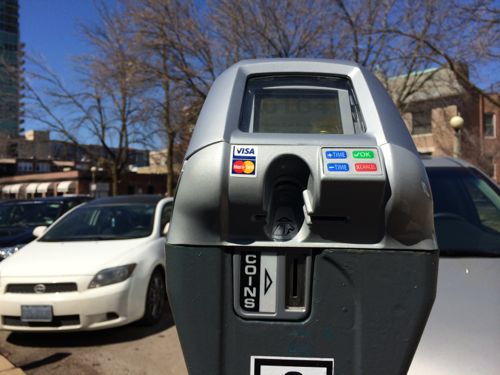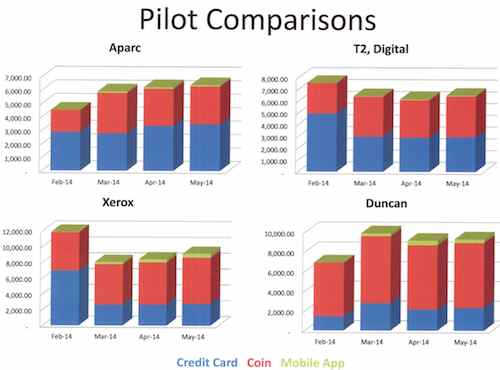Parking: Study Flaw, Open House Tonight, Consultant Hired (UPDATED)
SEE UPDATE AT BOTTOM.
The weekly poll that started on Sunday morning is about parking, but there’s more on the subject. First, St. Louis Treasurer Tishaura Jones is hosting an open house tonight:
The City of St. Louis Treasurer’s Office will conduct a town hall meeting to give the public the chance to meet the vendors participating in the parking technology field tests in downtown and the Central West End.
The meeting will be June 24 at the Central Library in downtown. A meet and greet with the vendors will take place at 6 pm, with a presentation to begin at 7 pm. The companies participating in the town hall are: Xerox, Duncan Solutions, Aparc Systems, and a joint proposal submitted by T2 Systems, Inc., Republic Parking System and Digital Payment Technologies. (source)
As of yesterday morning, tonight’s open house still wasn’t listed under the “Upcoming Events” heading. The above quote is from the blog post listed under “News” 0n May 29th, not holding my breath they’ll list the event as an event. The open house seeks feedback on the field tests of new parking meter technology. First, a little help with some of the jargon you’ll hear.
“Multi-space parking meters” includes two very different types: pay-per-space and pay-and-display. With the former each parking space is assigned a number for you to use when paying at a pay station, the latter you pay at a pay station but get a receipt to stick inside your car window to show payment, spaces aren’t formally designated. The pay-and-display form of multi-space parking meters aren’t being tested in St. Louis. Everyone should be familiar with single space meters.
A flaw recently occurred to me in the design of the pilot project to study two types of technology (Single space meters & Pay-per-space/multi-space stations) from four vendors. Two areas areas of the city were selected to try these: the Central West End (CWE) and Downtown. The problem is someone decided to test both vendors with single space meters in the CWE and two out of three pay-per-space stations downtown. One vendor, Xerox, being tested at Euclid & Laclede, has both single space meters & pay-per-space stations. To control for different conditions, users, etc. one of each type of technology should’ve been placed in each neighborhood, no single space meters are being tested downtown.

The most recent numbers compares the four vendors to each other, with no reference to historical revenues for the test areas with the current meters. Is one higher because of the technology or because that spot is busier?

As you can see above payment by coin (red) is larger than credit card (blue), with mobile payments barely registering. It’s expected after a system is selected that credit card and mobile payments will make up the bulk of the revenue. None accept bills.
Thankfully the Treasurer’s Office realized they need parking professionals to guide the city into the future…at least with respect to parking, they recently announced a firm to act as a consultant:
Desman Associates responded to a request for proposal (RFP) to hire a consultant to evaluate the City’s current on and off-street parking programs and to recommend improvements to the parking system. Desman Associates has conducted several parking studies in St. Louis, including studies for Ballpark Village, the Peabody Opera House, Grand Center, and Washington University.
“The parking study will be used to reform the current parking system and offer guidance as we look to implement new parking technology and modernize an outdated system,” said Tishaura O. Jones, Treasurer of the City of St. Louis. “We look forward to working with Desman Associates to create a first class parking operation for the City.”
Desman Associates is based in New York:
DESMAN Associates, is a professional corporation with more than 100 professional and technical personnel. The firm is a leading national specialist in transportation improvements and the planning, design and construction administration of functionally efficient, attractive and cost effective parking facilities. Since the firm’s inception in 1973, DESMAN has served public, private and institutional Clients and Owners throughout the U.S. and abroad and has provided planning, design, and restoration services for over 1,500 parking projects.
DESMAN operates from the nine following office locations:
- New York*
- Chicago
- Cleveland
- Washington, D.C.
- Hartford
- Boston
- Denver
- Ft. Lauderdale
- Pittsburgh
DESMAN Associates is also recognized as a certified Minority-owned Business Enterprise (MBE) by many states, municipalities and other government and public agencies that may help clients meet or exceed their affirmative action goals and policies.
* Corporate office
I’m not sure if representatives from Desman Associates will be at the open house tonight, I’ll be there (Central Library) to meet the four vendors at 6pm and see the presentation at 7pm. Remember, when Tishaura Jones ran for the office in 2012 she said repeatedly she didn’t want to be a “parking czar.”
UPDATED 6/25/2014 @ 7:30am, after talking with teams last night:
- The Xerox team is advocating a mixed approach for St. Louis with some multi-space stations and some single space, depending on the conditions. Block faces with few spaces the single space meters are more cost-effective to install. Other teams indicated they also advocate using both even though they’re only testing one type.
- In cities where a mobile app can be used everywhere the use rate ranges from 10-50%, right now so few meters accept mobile payments few have bothered to set up accounts.
- I was highly impressed by all four teams, the two mobile companies, and the town hall event.Kudos!
— Steve Patterson
The definition of wishful thinking: “payment by coin (red) is larger than credit card (blue), with mobile payments barely registering. It’s expected after a system is selected that credit card and mobile payments will make up the bulk of the revenue.” You do a test. The results are “coin payments are larger” and mobile payments barely register (less than 3% in one case, closer to 1% in others). Your conclusion is “that credit card and mobile payments will make up the bulk of the revenue.” WTF? My conclusion is that people want to be able to use their credit and debit cards, in addition to coins, and that they have little interest in using their phones. Based on the actual test data (and not wishful thinking), it appears that deploying meters with dual card and coin capability meets the needs of 98% of the market and that deploying meters / pay stations with the ability to handle mobile payments would be a waste of money!
My conclusion is you can’t extrapolate a small test to the entire city. In other cities, no different from St. Louis, people pay via credit card & mobile. It’s reasonable to expect the same results in St, Louis…eventually. Come tonight and ask the Treasurer about this.
I agree, a small sample always limits accuracy, to some degree. What this test does seem to show, for St. Louis, in 2014, across all vendors, at all test locations, is about a 50/50 split between cash and credit/debit and very little interest, at least now, for mobile. Yes, “In other cities, no different from St. Louis, people pay via credit card & mobile” – I accept that. What I’d like to see would be three things – a) in other cities, what percentage use mobile versus more traditional means (cash/debit/credit)? b) What is the incremental cost of adding mobile to just doing cash/debit/credit? Do we spend 25% more, now, to accommodate 2%, now, and maybe 10% in ten years? 5% more? 50% more? And c) what is the lifespan of the technology? Will it be obsolete in 5 years? Will it require costly, regular, proprietary upgrades? Remember, this is the government. The VA is still using 20 year old software for scheduling. Most of our current, “dumb” meters are more than a decade old (and still working). If the new meters / pay stations won’t work with future versions of iOS or Android (and still work with Blackberry and analog Kyocera), what have we gained? Heck, we have regular problems with various browsers not “playing nice” with your blog, today! Microsoft has discontinued support for XP, yet many people still use it. Check out navigation systems built into 5-year-old vehicles. Check out the car phones in 15-year-old vehicles. The latest and greatest is fine at the personal level, but KISS is something the government needs to keep doing to manage our finances appropriately and to serve all its citizens equitably.
You’re assuming collecting payments via mobile costs more. You know all those coins have to be collected manually, a very labor intensive process.
I agree – that’s why I want to know what the costs are to include mobile, both initially and on an annual basis, in addition to adding the ability to accept debit and credit cards. If it costs 5% more to add mobile, on top of debit/credit, then, sure, do it. But if we’re looking at a 25% premium (or some other exorbitantly high number), we need to weigh the convenience it would offer to a very small number of users versus the few additional revenues (if any) mobile payments would generate.
If we / the city wanted to offer true convenience, we’d have a paid attendant on every block, ready to accept whatever form of payment people want to use – live chickens, high-grade marijuana, checks, casino chips, dollar bills, credit cards, debit cards, pennies, whatever – the reality is that parking doesn’t cost much, here, and most people are good with either coins or cards – the tests show very little interest in mobile payments. Could that change in the future? Absolutely! But at this point, why should the city bet big bucks on something that only a few visionaries see as “the future”. If we did that in the 1950’s, we’d have a bunch of commuter airports spread around the region!
I talked to the various vendors last night. In other cities where the option to pay with a mobile app is ubiquitous the rate is 10%-50%.
Some cities opt to have users pay the processing fee if they want to use plastic (at meter or mobile). The difference is the credit card processing fee is slightly higher when the card isn’t swiped.
Thanks for the update – sounds like they’re on the right track.